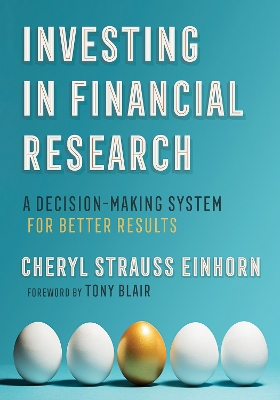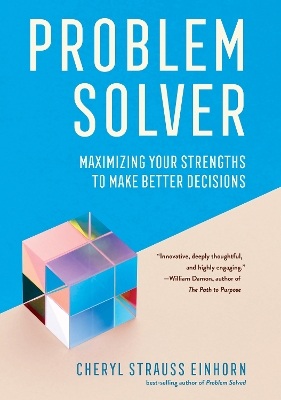AREA Method Publications
2 total works
Finalist in the Business/Personal Finance category of the 2019 International Book Awards
Every day, people around the world make financial decisions. They choose to invest in a stock, sell their holdings in a mutual fund or buy a condominium. These decisions are complex and financially tricky—even for financial professionals. But the literature available on financial research is dated and narrowly focused without any real practical application. Until now there's been a gap in the literature: a book that shows you how to conduct a step by step comprehensive financial investigation that ends in a decision.
This book gives you that how.
Investing in Financial Research is a guidebook for conducting financial investigations and lays out Cheryl Strauss Einhorn's AREA Method—a research and decision-making system that uniquely controls for bias, focuses on the incentives of others and expands knowledge while improving judgement—and applies it to investigating financial situations. AREA is applicable to all sorts of financial sleuthing, whether for investment analysis or investigative journalism. It allows you to be the expert in your own life.
The AREA Method provides you with:
*Defined tasks that guide and focus your research on your vision of success;
*A structure that isolates your sources, giving you insight into their perspectives, biases and incentives;
*Investigative resources, tips and techniques to upgrade your research and analysis beyond document-based sources;
*Exercises to foster creativity and originality in your thinking;
*A sequence and framework that brings your disparate pieces of research together to build your confidence and conviction about your financial decision.
Winner of the Independent Press Award in Psychology
Our decisions are expressions of who we are and how we move through the world. Rarely, though, do we examine our decisions or even look inward to consider the psychology of our decision-making. Instead, we often make decisions based on what we call instinct (which relies on cognitive bias), false assumptions, mis-remembering, and mental mistakes. Truthfully, we don't see the world as it is; we see it as we are.
We can develop self-knowledge about our decision-making styles. We can wake ourselves up to how biases cloud our judgment and impede good decision-making—and we can counter bias. From there, we can transform our decision-making habits to make better big decisions alone and together. Problem Solver provides you with tools to identify:
• The five basic decision-making approaches, or "Problem Solver Profiles" (PSPs): Adventurer, Detective, Listener, Thinker, and Visionary
• Your dominant—and secondary—PSPs
• Tools to assess other peoples' PSPs
• Each PSP's decision-making strengths, blind spots, and biases
• How your PSP impacts your outlook on life and your risk appetite
• How to use your PSP to maximize your decision strengths
Replete with real-life examples and replicable strategies to apply new decision-making skills for your immediate benefit, Problem Solver will do more than help you look out into a future; it will equip you to move forward, with confidence, into your future.

